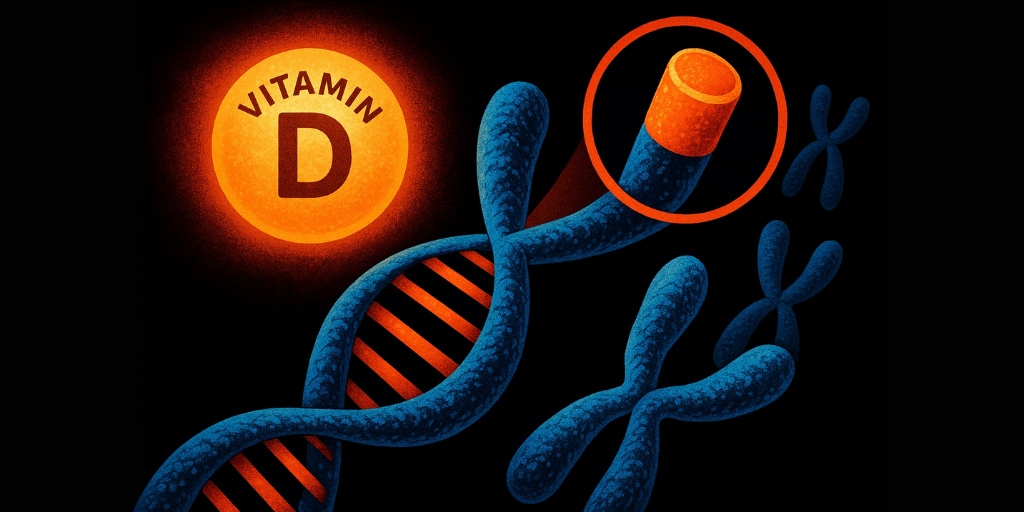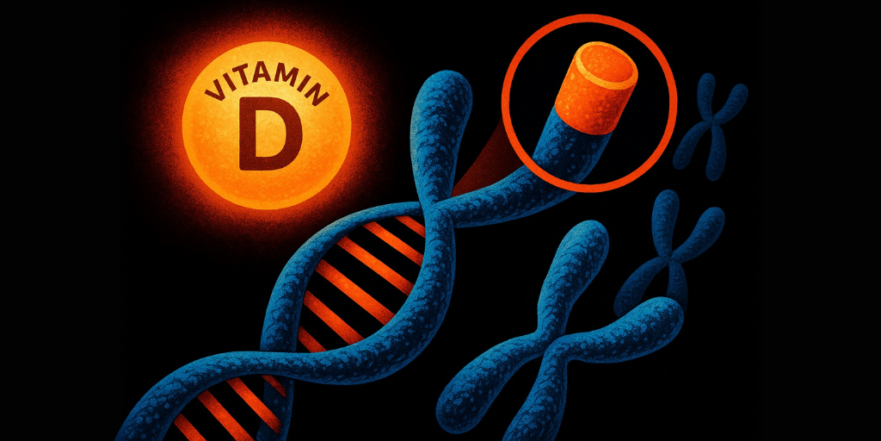
New research indicates that regular Vitamin D supplementation may significantly slow down cellular and biological aging, potentially extending lifespan. A recent study published in The American Journal of Clinical Nutrition suggests that Vitamin D helps preserve telomeres, the protective caps on chromosomes, which are crucial indicators of cellular age.
The Sunshine Vitamin’s Anti-Aging Secret
Vitamin D, often dubbed the “sunshine vitamin” due to the body’s ability to produce it upon sun exposure, has long been recognized for its roles in bone health, immunity, and inflammation reduction. However, its newly discovered potential in slowing biological aging stems from its impact on telomeres. Telomeres naturally shorten with each cell division, a process linked to aging and age-related diseases. The study found that Vitamin D supplementation significantly reduced this shortening.
Key Takeaways
- Telomere Preservation: Daily Vitamin D supplementation (2,000 IU/day) was shown to slow telomere shortening, effectively preserving telomere length over a four-year period. This effect was equivalent to preventing nearly three years of biological aging compared to a placebo group.
- Study Design: The findings are based on a sub-study of the large-scale VITAL trial, a randomized, double-blind, placebo-controlled clinical trial involving over 1,000 participants aged 50 and older. This robust methodology lends significant credibility to the results.
- Beyond Telomeres: Researchers noted that Vitamin D’s benefits extend to reducing inflammation and lowering the risk of chronic diseases associated with aging, such as advanced cancers and autoimmune conditions.
How Vitamin D Works Its Magic
Telomeres are like the plastic tips on shoelaces, preventing chromosomes from fraying. As cells divide, these tips shorten, eventually leading to cellular dysfunction or death. Vitamin D appears to mitigate this process, potentially by reducing oxidative stress and inflammation, both of which contribute to telomere attrition. While the exact mechanisms are still being explored, the study highlights Vitamin D’s role in maintaining DNA integrity and cellular health.
Important Considerations and Recommendations
While the findings are promising, experts caution against excessive supplementation. The recommended daily allowance for Vitamin D is 600 IU for adults aged 1-70 and 800 IU for those over 70. The study used a higher dose of 2,000 IU, which was found to be safe within the trial’s duration. However, “mega-dosing” can lead to toxicity and adverse effects, such as elevated calcium levels.
- Consult Your Doctor: Before starting any new supplement regimen, it is crucial to consult with a healthcare professional, especially for high-risk groups like individuals over 75, those with osteoporosis, or those with limited sun exposure.
- Holistic Approach: Experts emphasize that supplements are not a substitute for a healthy lifestyle. Adequate Vitamin D can be obtained through:
- Sunlight Exposure: 5-30 minutes of sun exposure a few times a week.
- Dietary Sources: Fatty fish (salmon, mackerel), fortified foods (milk, orange juice), egg yolks, and mushrooms.
Further research is needed to confirm these findings and to understand the long-term implications of Vitamin D supplementation on biological aging. However, this study provides compelling evidence for the potential of Vitamin D to contribute to a longer, healthier life at the cellular level.
Sources
- Vitamin D supplements may slow down your biological clock, new study finds, Fortune.
- Harvard study says Vitamin D may actually slow down aging, Times of India.
- Vitamin D may slow a process related to aging, new study suggests, The Washington Post.
- Can Vitamin D Fight Aging? New Research Suggests Yes, Everyday Health.
- Taking this vitamin regularly can slow down ageing and improve longevity, Times of India.

